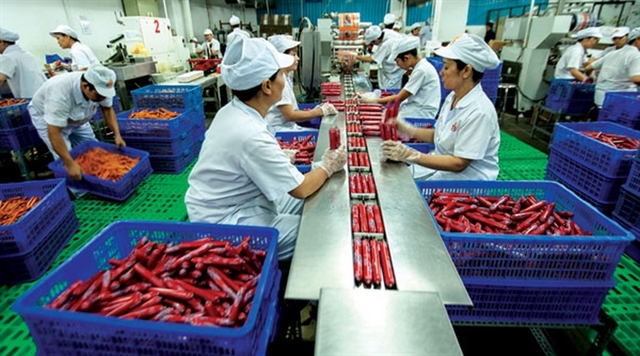 Economy
Economy


|
| At a food processing plant in HCM City. Food processing firms in the city have sped up production and prevention of the Covid-19. VNA/VNS Photo |
HCM CITY — Food processing firms in HCM City have stepped up production to meet demand while also enhancing safety measures for their staff amid the Covid-19 pandemic.
Vissan has organised three shifts to produce canned foods and various kinds of sausages and meat paste for the last month, but still does not have enough stocks to deliver to supermarkets and agents.
Phan Văn Dũng, deputy general director of Vissan, said: “Our warehouse for finished products is empty now, while orders have increased by 30-40 per cent for canned foods and 10 per cent for other food products compared to normal days.
“The process of producing canned foods takes a lot of time. But supermarkets and distribution agencies have been constantly calling to place orders or ask for delivery, and so though we have three shifts, we are unable to meet the demand.”
Saigon Food JSC has given up a part of exports since it has switched to production for the domestic market on two lines.
Lê Thanh Lâm, deputy general director of Saigon Food, said with the country fighting a pandemic, demand for food is rising, and the company has prioritised the domestic market.
"Orders have doubled since before Tết [before February]. Demand for fresh porridge has seen the strongest increase. Demand for frozen foods has also increased but is less than demand for fresh porridge. The company has introduced in the market instant foods such as chicken soup with glass noodles, fish paste vermicelli soup and fried rice, and seen that demand for these products is very good.”
Vietnam Food Industries Joint-Stock Company (Vifon)’s export orders have increased by 300 per cent from normal, with most orders being from long-term partners, and the company has managed to both fulfil them and increase supply in the domestic market.
In addition to speed up production, food processing firms have also enhanced prevention of the Covid-19.
Amid the pandemic outbreak, if one worker is infected, an entire factory has to be quarantined, and so enterprises have enhanced safety measures such as checking body temperature at the gate, requiring a medical declaration every day and re-arranging the work and eating schedules to minimise the risk of transmission between workers.
Vissan has for instance temporarily turned its parking lot into a temporary canteen for workers. It has also staggered workers’ lunch breaks and made them eat in groups to reduce direct contact with each other.
Companies have also switched the worker check-in and -out system to magnetic cards from fingerprints and begun carefully checking container trucks and transportation vehicles coming in and out of their factories.
Saigon Food said it has applied the third level of pandemic prevention, not allowing any guests in and disinfecting vehicles that enter and leave. — VNS




